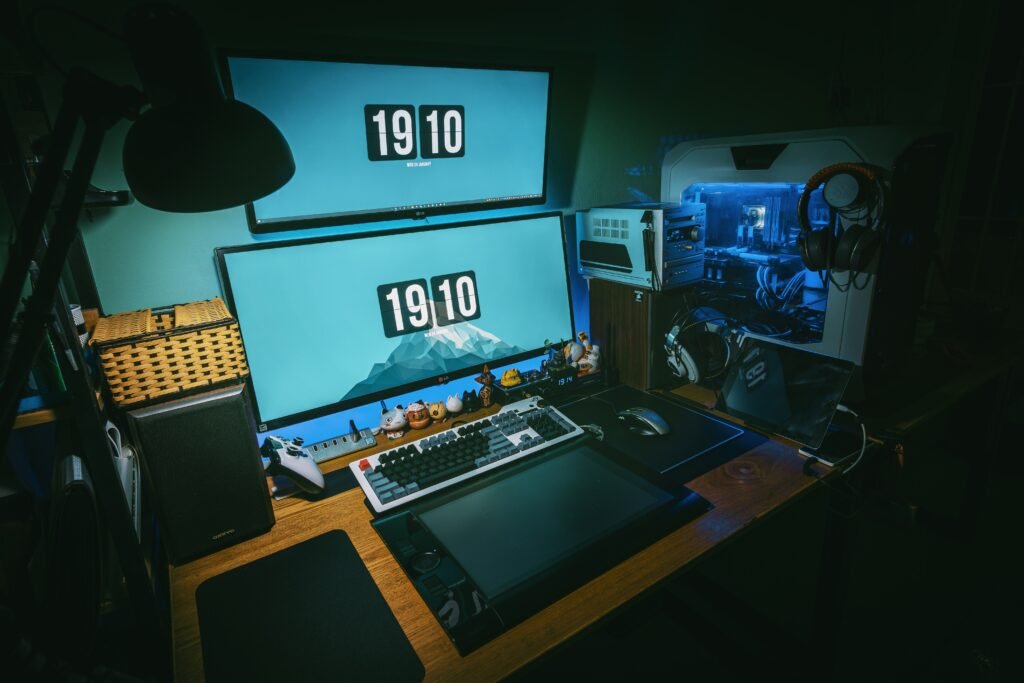As technology continues its relentless march forward, the gaming industry stands on the brink of unprecedented transformations. Here’s a speculative journey into what the gaming landscape might look like in the 2030s:

- Immersive Virtual Reality (VR) Experiences:
By the 2030s, VR technology is expected to reach new heights. Gamers will immerse themselves in hyper-realistic virtual worlds, blurring the lines between reality and the game. Enhanced haptic feedback, combined with advanced graphics and artificial intelligence, will create gaming experiences that are indistinguishable from the real world. - AI-Driven Gameplay:
Artificial intelligence will revolutionize gameplay. AI algorithms will adapt and personalize the gaming experience based on a player’s style, preferences, and skill level. Non-player characters (NPCs) will become incredibly sophisticated, offering dynamic, lifelike interactions, making single-player experiences as engaging as multiplayer ones. - Cloud Gaming Dominance:
With the widespread availability of high-speed internet, cloud gaming will become the norm. Gamers won’t need powerful consoles or gaming PCs; instead, they’ll stream games directly from the cloud. This accessibility will democratize gaming, making it available to a broader audience worldwide. - Augmented Reality (AR) Integration:
AR technology will blend the gaming world with the real world. Gamers will interact with virtual elements superimposed on their physical surroundings, creating innovative gameplay experiences. Location-based AR games will encourage outdoor exploration, combining physical activity with gaming. - E-sports Evolution:
E-sports will become even more mainstream, rivaling traditional sports in popularity. Professional gamers will achieve celebrity status, and e-sports tournaments will fill arenas with enthusiastic fans. The integration of VR and AR technologies will create entirely new competitive formats and spectator experiences. - Sustainable Gaming Practices:
Environmental concerns will drive the industry towards sustainable practices. Companies will focus on energy-efficient hardware, eco-friendly packaging, and responsible disposal of electronic waste. Gamers will support initiatives that promote conservation, making sustainable choices a significant factor in game development. - Neurogaming Advancements:
Neurogaming, where brain-computer interfaces enable direct communication between the brain and the game, will advance significantly. Players will control characters and environments using their thoughts, opening the door to entirely new gaming genres and experiences. - Inclusive and Diverse Content:
The gaming industry will prioritize inclusivity and diversity. Games will feature protagonists from various backgrounds, abilities, and gender identities, fostering a more inclusive gaming environment. Additionally, game narratives will explore complex social issues, encouraging empathy and understanding. - Personalized Game Development:
Advancements in AI and data analytics will enable personalized game development. Games will adapt in real-time based on player behavior and feedback, creating unique experiences for every player. This customization will enhance player engagement and satisfaction. - Social and Collaborative Gaming:
Social gaming experiences will become more immersive and collaborative. Virtual spaces where players can interact, socialize, and participate in activities together will flourish. Cross-platform gaming will be seamless, allowing players on different devices to join forces in real-time.
FAQs:
Q1: Will traditional gaming consoles become obsolete in the 2030s?
A1: Traditional gaming consoles might evolve, but their role will likely shift. Cloud gaming and streaming services will dominate, offering gaming experiences without the need for dedicated hardware.
Q2: How will neurogaming impact the gaming experience?
A2: Neurogaming will allow players to control games using their brain signals. This technology will revolutionize accessibility, enabling people with disabilities to enjoy gaming like never before.
Q3: What role will AI play in game development?
A3: AI will personalize games, adapting challenges and storylines based on individual players’ behaviors. It will also enhance NPC interactions, making in-game characters more responsive and lifelike.
Q4: Will augmented reality gaming be limited to mobile devices?
A4: No, AR gaming will extend beyond mobile devices. AR glasses and wearable technology will enable immersive experiences, blending the virtual and physical worlds seamlessly.
Q5: How will the gaming industry address environmental concerns?
A5: Game developers will adopt eco-friendly practices, focusing on energy-efficient hardware, sustainable packaging, and responsible recycling. Gamers will support these initiatives, encouraging environmentally conscious choices.


